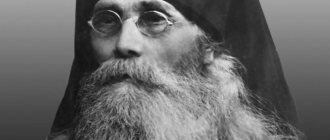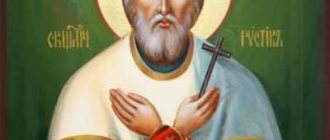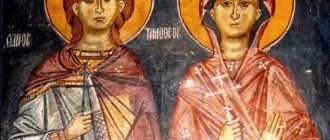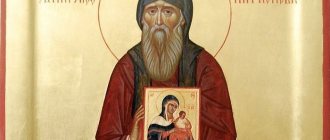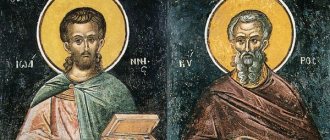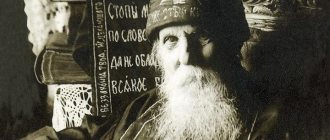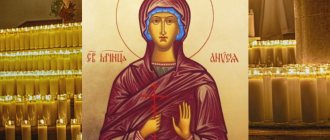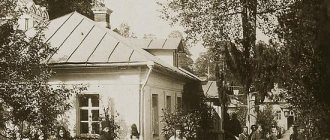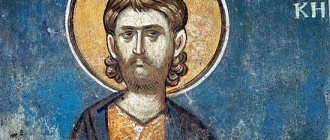Life of St. Joseph of Optina
Ivan Litovkin (the future Elder Joseph of Optina) was born in a rural area of the Kharkov province in November 1837 into a large family (he had a sister and four brothers). When Ivan was 11 years old, the children were left orphans: first their father died, then their mother. The boy suffered hunger, cold, humiliation and beatings. He was forced to earn his living without having any moral or material support from anyone.
At the age of 23, on the advice of his nun sister, Ivan went to Optina Pustyn. Elder Ambrose invited him to remain at the monastery as a laborer. The young man happily agreed. After the hardships he had endured, the peace of the monastery seemed to him a great blessing. The novice was sent to the refectory, where there was always a lot of work.
Ivan showed himself at his best: hardworking, kind, obedient. After 4 years, Litovkin was tonsured into the ryasophore (incomplete monastic tonsure) under the name John. Elder Ambrose took the novice into his cell to raise him to be a future elder.
In 1872, Ivan was tonsured into the minor schema (mantle) under the name Joseph, 5 years later he was ordained a hierodeacon, and in 1884 a hieromonk. For 30 years, Ivan served as the “press secretary” of the Monk Ambrose. Elder Ambrose did not spare him, subjecting him to difficult trials for a long time in order to develop long-suffering and humility.
Subsequently, he became the senior cell attendant of Elder Ambrose.
More and more often, the monk sent his visitors to Joseph so that they would seek advice from the cell attendant, trusting his intelligence and knowledge.
In 1888, when the saint was 51 years old, he caught a severe cold and was near death. With the blessing of Elder Ambrose, he was tonsured into the schema, but the fatal illness subsided. In 1890, a year before his death, the Monk Ambrose left Optina Pustyn, leaving Joseph in his place. For 12 years, Joseph served as head of the monastery, confessor of the brethren of the Optina Monastery and nuns of the Shamordino Monastery.
By this time, the elder’s health had deteriorated significantly, but he did not allow himself any indulgences in anything: he adhered to constant strict fasting, prayed at night, and held spiritual conversations with pilgrims, monks and nuns during the day. His clothes were worn out, the same at all times of the year.
The Monk Joseph was a man of few words. He knew how to convey his thoughts in a few short and understandable phrases, thereby instructing and comforting those who turned to him for spiritual support or advice.
This boy is going to be something special.
The path of the Monk Joseph, (in the world of Ivan Efimovich Litovkin), to God began in childhood. He was born into a kind, pious and believing family in the village of Gorodishche, Starobelsky district, Kharkov province. His father, Efim Emelyanovich, was the head of his village and enjoyed universal respect. Mom, Marya Vasilievna, was strict, but fair and merciful.
Both father and mother constantly did good to the poor, sometimes they gave out alms even in secret from each other, according to the Gospel word, so that the right hand did not know what the left hand was doing. They loved to welcome monks into their home, collecting money for the monastery, and always donated to the temple. The father often expressed a desire for one of his children to devote themselves to God.
The parents taught all their children (and there were six of them: three sons and three daughters) to always go to church, pray and read spiritual books. They especially loved the lives of saints. And the second son was named John in honor of his beloved Saint John the Merciful. The protection of this saint was over John all his life, and he grew up to be an unusually kind child. Already in early childhood, with his gentle and sensitive soul, he knew how to feel someone else’s grief, and, seeing one of his relatives in sadness, he silently approached and, like a child, tried to console and caress the suffering person.
It is interesting that, according to the testimony of contemporaries, all the elders of Optina from childhood bore the stamp of being chosen, of God’s special favor. The future Reverend Macarius heard the words of his beloved mother, who more than once spoke about the quiet and meek Mishenka: “My heart feels that something extraordinary will come out of this child.”
His wise father, as well as his mentor, the archpriest, said something similar about little Vanya: “Something special will come out of this boy.” Such words and being chosen from the mother’s womb remind us of the abbot of the Russian land, the Venerable Sergius of Radonezh and the Venerable Seraphim of Sarov.
Other signs of his chosenness were a vision of the Mother of God in childhood, after which the child began to shy away from children's games, and a living faith and love for the Queen of Heaven kindled in his childish heart. Soon after this vision, a fire broke out in the village. The fire threatened to spread to the Litovkins’ new, newly built house. Little Vanya turned to the Mother of God with prayer and began shouting: “Queen of Heaven! Leave us our house!” And the house remained standing unharmed in the midst of the fire, while everything around it burned down.
The older sister, who later became a nun, taught Vanya to read and write. And he went to study, already understanding how to read and write. He studied well at school, and the teachers appreciated his abilities.
Death and canonization
From 1905 to 1911, the elder became increasingly weaker, but did not abandon his ministry. On May 22 (new style), 1911, he died quietly.
The discovery of the relics of St. Joseph took place in October 1988. They were reburied in the Vladimir Church of the Optina Monastery. In 1996, the outstanding Optina elder was canonized as a saint of the Optina Hermitage. In 2000, together with 14 venerable Optina elders, he was glorified for church-wide veneration.
The beginning of monastic life
Thus, on March 1, 1861, the monastic life of the young novice began in Optina next to the great elder. Ivan was 24 years old, and a half-century-long monastic journey lay ahead of him.
According to Optina customs, for the sake of humility, novices were sent to the refectory for difficult and troublesome obedience. “Brother Ivan” became an assistant cook at the monastery. But the young novice, who had experienced grief in the world, was only glad that he found himself in a quiet monastery, far from temptations and vanity. From the very first days, all the good qualities of his pure soul, which the Lord allegedly initially prepared for monastic life, were revealed in him. Modesty, obedience, honesty, kindness, silence and love of prayer - all these were good makings for a real monk. And these qualities did not go unnoticed.
Works of a monk
At the beginning of 2000, the Publishing Council of the Russian Orthodox Church recommended for publication the book “Two Wings,” compiled from the works of St. Joseph of Optina. The compiler, Chuntonov D.S., included in it the surviving statements of the pillar of Optina Hermitage on the most important issues of faith. They briefly and succinctly set out the thoughts of Optina’s spiritual father.
The title of the work is taken from a statement by an Orthodox thinker:
“Coldness and contempt on the part of others can only serve to our spiritual benefit, that is, to humility and patience. With these two wings we can fly from earth to heaven: we will endure, we will humble ourselves, and we will be saved.”
For Orthodox believers, this book is a source of wisdom, a guide to action, and consolation.
Examples of statements by St. Joseph of Optina:
- "Repentance and Falls
Repentance is higher than all virtues. But in the hope of God’s mercy and repentance, one should not continue to sin. Such people are suddenly snatched away by death. And having sinned, you should not despair. It is common for angels not to fall, for people to fall and get up soon, and for demons to never rise.
Whoever does not lose heart from the occasional falls will be praised by the Angels as a brave warrior! The angels rejoice in heaven over one sinner who repents. And the Savior says that He came to save sinners and that the sick require a doctor, not the healthy. God judges repentance not by the measure of work, but by the measure of humility (Luke 18:10–14). Some took upon themselves labors and exploits in order to receive forgiveness, but a person who does not remember evil preceded them, for the word is true: if you forgive a little, you will be forgiven a lot (Luke 6:37; 1 Cor. 13:1–8:13).” .
- "Patience and pride
If you do not endure sorrows, or even if you do endure it, only with grumbling, with anger, with vexation, with irritation, what kind of patience is this? This is only the rooting of malice, anger, and from this - pride.”
- "Humility
When obstacles are encountered on the path of salvation, we must humble ourselves and ask God for help. Humility is better than vainglorious virtue.”
A pure soul
Worldly temptations bypassed the pure soul of the young man; the Lord kept him among a rough and often corrupt environment. With him was the Protection of the Mother of God. Ivan never drank wine and never played cards. Didn't talk to girls. He was once asked: “Did you like anyone in the world?” To this he responded with naive simplicity, which testified to his sincerity and innocence: “But I was short-sighted and could not see anyone well from afar; but he was ashamed to come close - he was shy. It used to be very difficult for me when the owner, in front of guests, would send to call someone, but from afar I couldn’t figure out who to approach.” In general, he always experienced a melancholy feeling in the world; and prayer - this is the only inheritance that he inherited from his pious parents - was the constant companion of his sorrowful life, and the temple was the only place of consolation, where his piously-minded heart always attracted him.
When, finally, Ivan got a good job with a pious merchant, he was so touched by the purity and honesty of the young man that he decided to marry him to his daughter. But the Lord called the young man to a different path. And he felt this calling. Therefore, when his nun sister wrote to him about the monastery of Optina Pustyn, which was famous for its elders, Ivan decided to leave the world and go on pilgrimage.
School of Humility
Soon the novice was transferred as a cell attendant to the great elder Ambrose, and he lived in the elder’s hut for fifty years: thirty years next to the Monk Ambrose and twenty after his death, when Father Joseph himself had already become an elder. A huge number of people came to the elder, looking for elder advice and care.
Ivan had to endure numerous clashes and temptations that occurred accidentally and deliberately, “for testing.” The senior cell attendant, stern and gloomy, often reprimanded him, sometimes unfairly. Ivan didn’t even have his own corner where he could read, pray, or rest. He slept in the reception room, which was full of visitors almost until midnight, and at one in the morning he had to go to matins...
And this was a school of humility, when the young novice learned patience and self-reproach, which are so sweet and gracious. Injustice irritates an ordinary person, but if he learns to accept everything as if from the hand of the Lord, and considers himself worthy of all condemnation, then he becomes a spiritually experienced ascetic, and finds peace and quiet, joy in the Lord.
We are better than on Mount Athos, stay with us
It was no coincidence that the Lord brought Ivan to this shack: the future elder became spiritually tempered, became a witness to the spiritual struggle and prayers of the great ascetic. But such tests were very difficult for a fragile spiritual warrior. He began to be tormented by thoughts about the cherished Kyiv, about peace and quiet, about the holy Mount Athos. Once, when the thoughts of leaving for Athos were especially annoying, the novice heard the voice of an elder behind him, who lightly hit him on the shoulder and said: “Brother Ivan, we are better than on Athos, stay with us.”
The elder’s insight so struck the young novice that he fell at the feet of the Monk Ambrose with tears of repentance. From that moment on, he clearly understood that the thoughts that troubled him were simply temptation. What other mentors should he look for if next to him is an old man who reads his thoughts?! And the young man no longer thought about leaving. Until the very departure of the Monk Ambrose to Shamordino, he was a faithful and devoted assistant and cell attendant of the great elder.
Acquire a peaceful spirit
The elder’s second cell attendant, Father Mikhail, was a kind man, but with a harsh disposition. He often shouted at the younger cell attendant, but he managed to win him over with his meekness and patience, and they soon became friends. And after the death of the Monk Ambrose, Father Mikhail even chose the former junior cell attendant as his confessor, although he was older in years and in priestly rank.
The disciple and scribe of Elder Ambrose was Hieromonk Clement Zederholm (the son of a German pastor who converted to Orthodoxy). He was a very noble man of high spiritual life, but extremely hot-tempered, with a hot character. Things did not go well with any of the elder’s cell attendants; he repented, asked forgiveness for his incontinence, but he could not control himself. The young novice came out victorious here too; his humble disposition and meekness pacified even the most hot-tempered and angry people. Father Clement himself said about him that this is “the only person with whom I cannot, I do not know how to be irritated.”
The words of St. Seraphim of Sarov came true on it: “Acquire a peaceful spirit, and thousands around you will be saved.”
